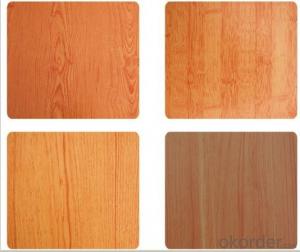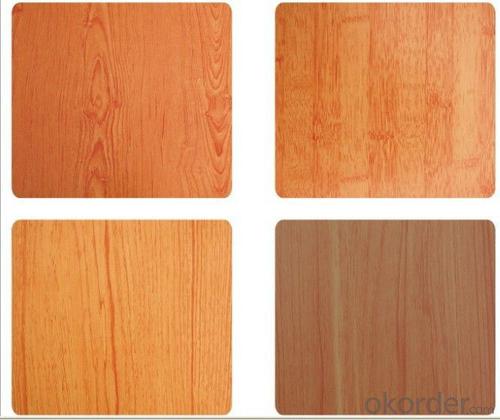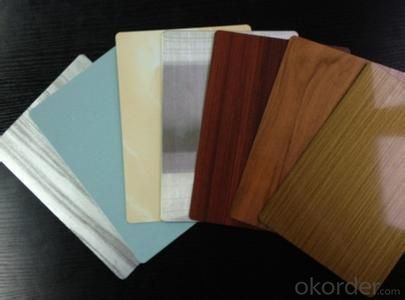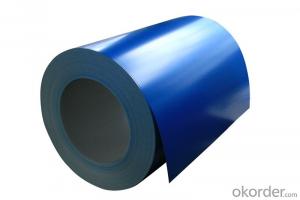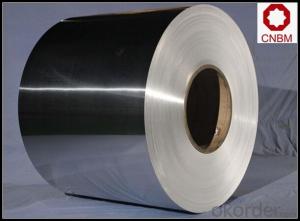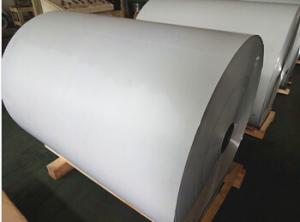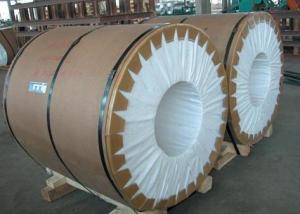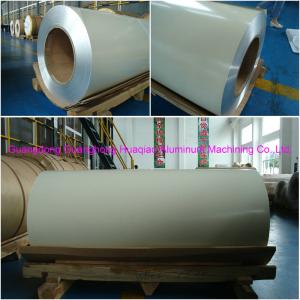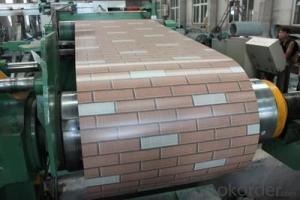High Quality PE Color Coating Coil Aluminum Stock
- Loading Port:
- Shanghai
- Payment Terms:
- TT OR LC
- Min Order Qty:
- 5 m.t.
- Supply Capability:
- 10000 m.t./month
OKorder Service Pledge
OKorder Financial Service
You Might Also Like
Specification
1. Specification of PE Color Coating Aluminum Coil with High Quality
Material | Alloy Aluminum 6063,6061,6005 or customer nominated |
Temper | T3, T4, T5, T6 |
Surface | Anodize, electrophoresis, powder coating, PVDF coating, wood grain painting, matted, etc. |
Colour | Any colour based on Standard Germany RAL Mark |
Length | Coating 6.5 meters, Anodizing 6.5 meters, Mill finish 5 meters |
Press Machine | 500-4000 tons all together 64 press lines. |
Fabrication | 1. Windows and doors; 2. Drilling; 3. Bending; 4. Cutting; 5. etc. |
Certificate | ISO 9001 |
Moulding | 1. Using our moulds, no fee; |
2. Using customer drawing, opening mould, usually about 10~50 tons then the moulding can be refunded. | |
3. Mould cost is negotiable base on the order quantity | |
Capability | Annual output 100,000 tons |
2. Application of PE Color Coating Aluminum Coil with High Quality
(1).Interior: wall cladding, ceilings, bathrooms, kitchens and balconies, shutters, doors...
(2).Exterior: wall cladding, facades, roofing, canopies, tunnels,column covers , renovations...
(3).Advertisement: display platforms, signboards, fascia, shop fronts...
3. Feature of PE Color Coating Aluminum Coil with High Quality
*Such coil is specially designed to replace aluminum ingot, due to the high export tax of aluminum ingot, the coil has better price than ingot.
*This type of coil can fit customer's remelting furnace just like ingot, no need to make any change to the production line that was previously used for ingot. The standard coil size and weight is very suitable for the feed gate of furnace.
*This type of coil causes less material wastage than ingot when remelted.
*Our coil is made directly from ore, no need to go though the ingot making process, quality is much better than other suppliers who use ingot scrap to make coil.
Be free from Oil Stain, Dent, Inclusion, Scratches, Stain, Oxide Dicoloration, Breaks, Corrosion, Roll Marks, Dirt Streaks and other defect which will interfere with use
4. Certificate:
SGS and ROHS(if client request, paid by client), MTC(plant provided), Certificate of Origin(FORM A, FORM E, CO), Bureau Veritas and SGS (if client request, paid by client), CIQS certificate
5. Image of PE Color Coating Aluminum Coil with High Quality
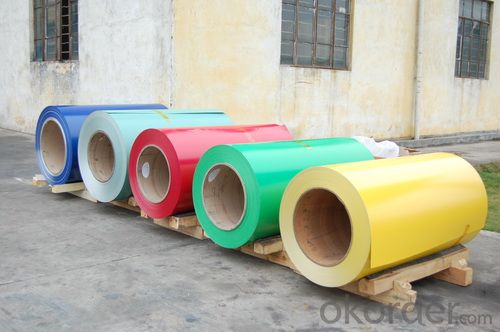
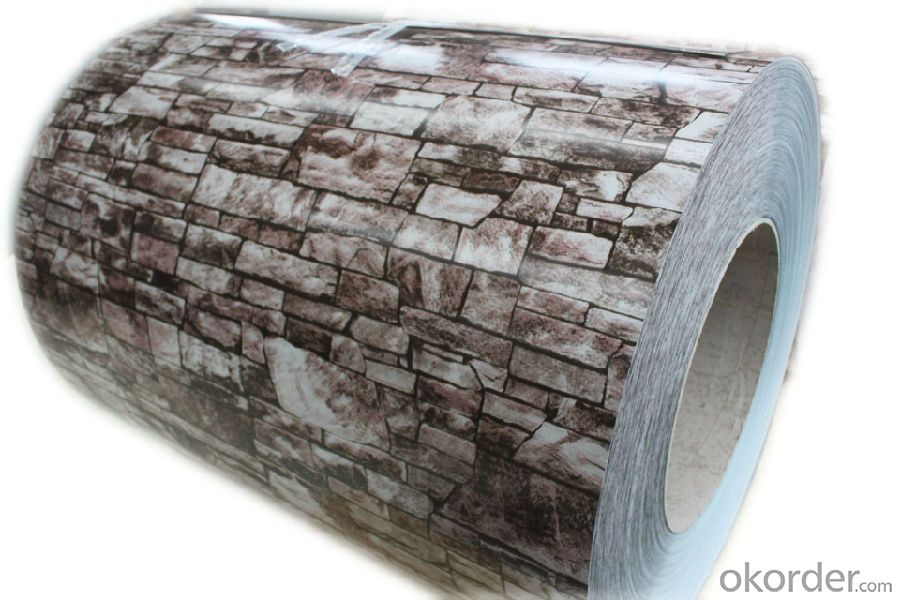
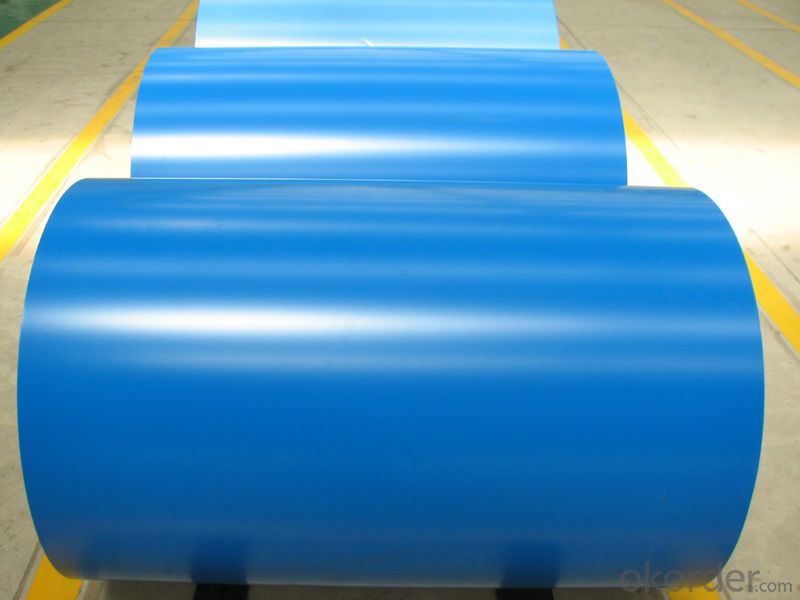
6. Package and shipping of PE Color Coating Aluminum Coil with High Quality
eye to wall
eye to the wall
with wood pallet (wooded case also available)
7. FAQ
1) What is the delivery time?
Dpends on actual order, around 20 to 35 days
2)What is the QC system:
We have QC staff of 20 persons and advanced equipment, each production is with MTC traced from Aluminum ingot lot.
3) What market do you mainly sell to?
Australia, America, Asia, Middle East, Western Europe, Africa etc
- Q: How are aluminum coils tested for mechanical properties?
- Aluminum coils are typically tested for mechanical properties through various methods such as tensile testing, hardness testing, and bend testing. Tensile testing involves subjecting a sample of the coil to tension until it breaks, allowing for the measurement of its yield strength, ultimate tensile strength, and elongation. Hardness testing measures the coil's resistance to indentation or scratching, providing an indication of its strength and durability. Bend testing assesses the coil's ability to withstand deformation by bending it to a specific angle without cracking or breaking. These tests help evaluate the mechanical properties of aluminum coils, ensuring their suitability for specific applications.
- Q: Are there any limitations or restrictions on the use of aluminum coils?
- Yes, there are limitations and restrictions on the use of aluminum coils. Some of the main limitations include: 1. Corrosion: Aluminum is prone to corrosion, especially when it comes into contact with certain chemicals or environments. Therefore, it may not be suitable for applications where it will be exposed to corrosive substances or in highly corrosive environments. 2. Strength: While aluminum is a lightweight material, it is not as strong as other metals like steel. This can limit its use in applications that require high strength or load-bearing capabilities. 3. Temperature sensitivity: Aluminum has a lower melting point compared to other metals, which can be a limitation in applications where high temperatures are involved. It may not be suitable for use in certain industrial or high-temperature environments. 4. Electrical conductivity: While aluminum has good electrical conductivity, it is not as conductive as copper. This can limit its use in applications where high electrical conductivity is required, such as in electrical wiring or power transmission. 5. Cost: Aluminum can be more expensive than other metals, limiting its use in applications where cost is a significant factor. In such cases, alternative materials may be preferred. 6. Formability: Aluminum coils can be difficult to form or shape compared to some other metals. This limitation may restrict their use in applications where complex shapes or tight tolerances are required. It is important to consider these limitations and restrictions when selecting aluminum coils for a particular application. Careful evaluation of the specific requirements and constraints will help determine whether aluminum coils are suitable or if alternative materials should be considered.
- Q: How do aluminum coils compare to fiberglass coils in terms of weight?
- Aluminum coils are generally lighter in weight compared to fiberglass coils.
- Q: What are the common handling and storage practices for aluminum coils?
- The common handling and storage practices for aluminum coils involve several key steps to ensure their integrity and prevent damage or degradation. 1. Protection from physical damage: Aluminum coils should be handled and stored in a way that minimizes the risk of physical damage. This includes using proper lifting equipment to avoid dropping or mishandling the coils, as well as storing them in a secure location away from potential hazards such as heavy machinery or sharp objects. 2. Proper stacking and support: When stacking aluminum coils, it is important to ensure that they are supported evenly and not overloaded. Excessive weight or uneven support can cause deformation or even collapse of the coils. The use of appropriate stacking equipment and supports, such as pallets or racks, is recommended to maintain the integrity of the coils. 3. Protection from moisture and corrosion: Aluminum is susceptible to corrosion, especially when exposed to moisture. Therefore, it is crucial to store aluminum coils in a dry environment to prevent the formation of rust or other forms of corrosion. Coils should be stored in a covered area or inside a warehouse to protect them from rain, snow, or excessive humidity. Additionally, wrapping the coils in a protective material, such as plastic or moisture-resistant packaging, can provide an extra layer of defense against moisture intrusion. 4. Temperature control: Extreme temperatures can impact the quality and performance of aluminum coils. It is recommended to store them in a temperature-controlled environment to prevent any adverse effects. Excessive heat can cause the coils to expand or distort, while extreme cold can make them more brittle and prone to cracking. Maintaining a stable temperature within the recommended range ensures the longevity and usability of the aluminum coils. 5. Handling and storage guidelines: It is essential to follow any specific handling and storage guidelines provided by the manufacturer or supplier of the aluminum coils. These guidelines may include recommendations on stacking height, weight limits, and any necessary precautions to prevent damage or deformation. Adhering to these guidelines will help maintain the quality and usability of the coils. By implementing these common handling and storage practices for aluminum coils, you can ensure their protection, integrity, and optimal performance throughout their lifespan.
- Q: What are the differences among various types of steel wires and their respective coiling techniques?
- <p>Yes, there are differences between different types of steel wires and their coiling methods. Steel wires can be categorized based on their composition, strength, and use, such as carbon steel, stainless steel, and alloy steel wires. Each type has unique properties that affect their coiling methods. For instance, carbon steel wires are strong and ductile, suitable for standard coiling techniques, while stainless steel wires offer corrosion resistance and may require special handling to prevent damage. The coiling methods also vary; some common ones include spool coiling, loop coiling, and pancake coiling. Each method has specific applications and considerations for wire diameter, tension, and storage. Understanding these differences is crucial for selecting the appropriate wire and coiling technique for a given application.</p>
- Q: Are aluminum coils resistant to chemical exposure?
- Yes, aluminum coils are generally resistant to chemical exposure. Aluminum is known for its excellent chemical resistance, making it suitable for various industrial applications where it may come into contact with different chemicals. However, the specific level of resistance can vary depending on the type and concentration of the chemical involved.
- Q: Are aluminum coils suitable for construction applications?
- Indeed, construction applications can make good use of aluminum coils. Aluminum, a material known for its lightweight and durability, is extensively utilized in the construction sector. Aluminum coils find frequent application in roofing, siding, gutters, and other exterior uses owing to their resistance against corrosion and ability to withstand inclement weather conditions. Furthermore, their simple installation and maintenance procedures make them highly favored by contractors. Moreover, aluminum coils can be painted or coated to enhance their visual appeal and blend with the overall architectural design of a structure. Ultimately, aluminum coils offer a dependable and economical option for construction purposes.
- Q: What are the potential applications of color-coated aluminum coils?
- Color-coated aluminum coils have a wide range of potential applications due to their versatility and durability. One of the main uses of these coils is in the construction industry. They can be used for cladding buildings, roofs, and facades, providing an aesthetically pleasing and long-lasting solution. The color coating on the aluminum coils not only adds visual appeal but also protects the metal from corrosion and environmental damage. Another application of color-coated aluminum coils is in the manufacturing of transportation vehicles. These coils can be used for making panels, doors, and other parts of automobiles, trucks, and trailers. The color coating not only enhances the appearance but also offers protection against harsh weather conditions, UV rays, and other external factors. Color-coated aluminum coils are also commonly used in the production of household appliances. They can be used for manufacturing kitchen appliances, such as refrigerators, ovens, and microwave ovens, as well as for creating decorative elements in interior design, such as wall panels, ceilings, and furniture. Furthermore, color-coated aluminum coils find applications in the signage industry. They can be easily shaped, cut, and formed into various sizes and shapes, making them ideal for creating eye-catching signs, billboards, and advertising displays. The color coating ensures that the signs remain vibrant and attractive for an extended period. In addition to these industries, color-coated aluminum coils are also used in the manufacturing of electronic products, such as laptops, smartphones, and tablets. The coils can be used for creating casings, frames, and other parts that require both durability and aesthetic appeal. Overall, the potential applications of color-coated aluminum coils are vast and diverse. Their versatility, durability, and aesthetic appeal make them an excellent choice for various industries, including construction, transportation, household appliances, signage, and electronics.
- Q: This question asks for the method to determine the weight of a steel coil.
- <p>To calculate the weight of a steel coil, you need to know its length, width, and thickness, as well as the density of the steel material. The formula to calculate the weight is: Weight = (Length 脳 Width 脳 Thickness) 脳 Density. The density of steel is approximately 7850 kg/m鲁. Convert the dimensions to meters if they are not already in that unit. Multiply the volume (length 脳 width 脳 thickness) by the density to get the weight in kilograms. For example, if a coil is 2 meters long, 1 meter wide, and 0.005 meters thick, its weight would be (2 脳 1 脳 0.005) 脳 7850 = 78.5 kg.</p>
- Q: What are the typical production volumes for aluminum coil manufacturers?
- Aluminum coil manufacturers' production volumes can vary depending on factors like the size of the manufacturer, market demand, and production capacity. Generally, these manufacturers produce large quantities of coils to meet the needs of different industries. Some manufacturers produce a few hundred tons of aluminum coils per month, while others with larger production capacities can produce thousands of tons. The specific requirements of customers also influence production volumes, as manufacturers customize their production to meet customers' demands. Industries like construction, automotive, packaging, and aerospace have high demand for aluminum coils, leading to increased production volumes. Manufacturers can also produce various sizes and thicknesses of aluminum coils, further expanding their production volumes to cater to diverse market needs. It is important to consider that production volumes for aluminum coil manufacturers can fluctuate based on market conditions, economic factors, and industry trends. Manufacturers continually work towards optimizing their production processes and capacities to efficiently meet demand while maintaining high-quality standards.
Send your message to us
High Quality PE Color Coating Coil Aluminum Stock
- Loading Port:
- Shanghai
- Payment Terms:
- TT OR LC
- Min Order Qty:
- 5 m.t.
- Supply Capability:
- 10000 m.t./month
OKorder Service Pledge
OKorder Financial Service
Similar products
Hot products
Hot Searches
Related keywords
